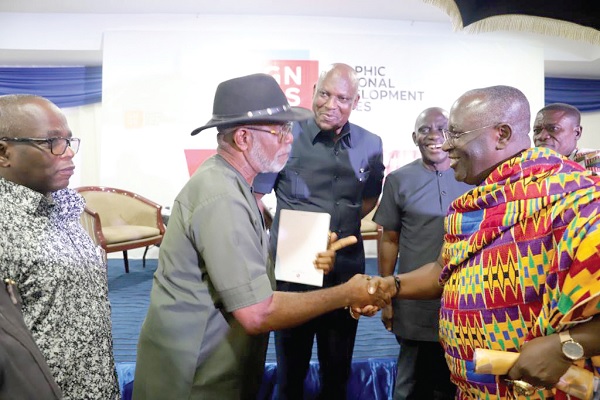
Addressing food insecurity: Agric needs new model - Prof. Nzamujo
A reverend Father and computer engineer, Professor Fr Godfrey Nzamujo, has called for a systemic paradigm shift in the agricultural and food systems to address the issue of food security.
He said the old conventional way of food production and agriculture were ineffective and a major challenge to food security and, therefore, called for a radical change to address the current food security challenges confronting the country.
Prof. Nzamujo, who is also the Founder of the Songhai Centre in Benin, was speaking at the maiden edition of the Graphic National Development Series (GNDS) in Kumasi last week.
It was on the theme: “Transforming Ghana's agriculture using home-grown solutions for food security”.
Making submissions on the topic: “Producing food with surplus for a rainy day: The integrated approach”, the Catholic Priest who has revolutionised sustainable farming in Benin and parts of Africa, said there was the need to move away from the piecemeal, disjointed approach to agriculture to a fully integrated ecological system where everything worked together.
"We must recognise that conventional agriculture is inefficient due to the low utilisation of solar energy in the conventional system," Prof. Nzamujo, who won the End Hunger Award along with the late former President Jerry John Rawlings, said.
He noted that the current climate crisis, coupled with the negative impact of the conventional food and agricultural system, had become an existential threat to Africa.
Model untenable
Prof. Nzamujo, whose centre is into organic agriculture, said according to the ECOWAS Commission, the current agricultural model, with its dependence on cheap labour, insecure livelihood and over-exploitation of natural resources, had become untenable.
He was confident that taking action through investment in sustainable agricultural practices would cost about 1.15 per cent of the Gross Domestic Product (GDP) of most African countries over the next 15 years.
However, he said, the cost of inaction on the part of governments in the sub-region was in the region of 12 to 13 per cent of their GDPs, adding that it would be cheaper and more profitable for the government to invest in sustainable agricultural practices than not to take action at all.
The professor, who had preached the need for a new beginning for Africa to realise its dream of attaining food security, chastised Africa for the lack of planning.
Comparing the West to Africa, he said in the West, because they had winter, the people always prepared ahead of that season, but the challenge of Africa "is the winter gap”.
"We do not prepare for a rainy day, but with the new beginning, we have to prepare because we cannot continue to share poverty," he emphasised.
He said the continuous importation of food from other countries was a big disservice to the country because "each time we import something from other countries, we are creating jobs there”.
"We keep exporting wealth and importing poverty. We must stop that practice," he stressed.
Prof. Nzamujo preached the need to patronise locally produced goods and food items to stem the over-dependency on imported goods, to the detriment of local products.
Microbial
Touching on agriculture of the future, he underscored the power and the role of micro-organisms in the food and agricultural systems.
He said the best ways to increase the production of biomass and the carbon content of soil in Africa, which is the foundation of soil regeneration, was the rebirth of healthy, diverse and active indigenous microbial communities.
“These regenerative micro-organisms could form the basis of an authentic technology to unleash the potential of our planet's biological and environmental capitals,” Prof. Nzamujo said.
He said harnessing such environmental capital, especially microbes, would constitute the foundation of post-conventional agro-food systems in Ghana and elsewhere in Africa.
National strategy
For his part, an agricultural consultant, Abraham Dwuma Odoom, said he looked forward to “a national agricultural strategy for all time, so that political parties or governments will have to continue uncompleted programmes” by their predecessors.
Mr Odoom, a former Member of Parliament (MP) for Twifo-Atti-Morkwa in the Central Region, was of the opinion that such a strategy would permit experts to be brought on board for long-term research/extension services, adding that it would also ensure the development of various value chains in the agricultural sector.